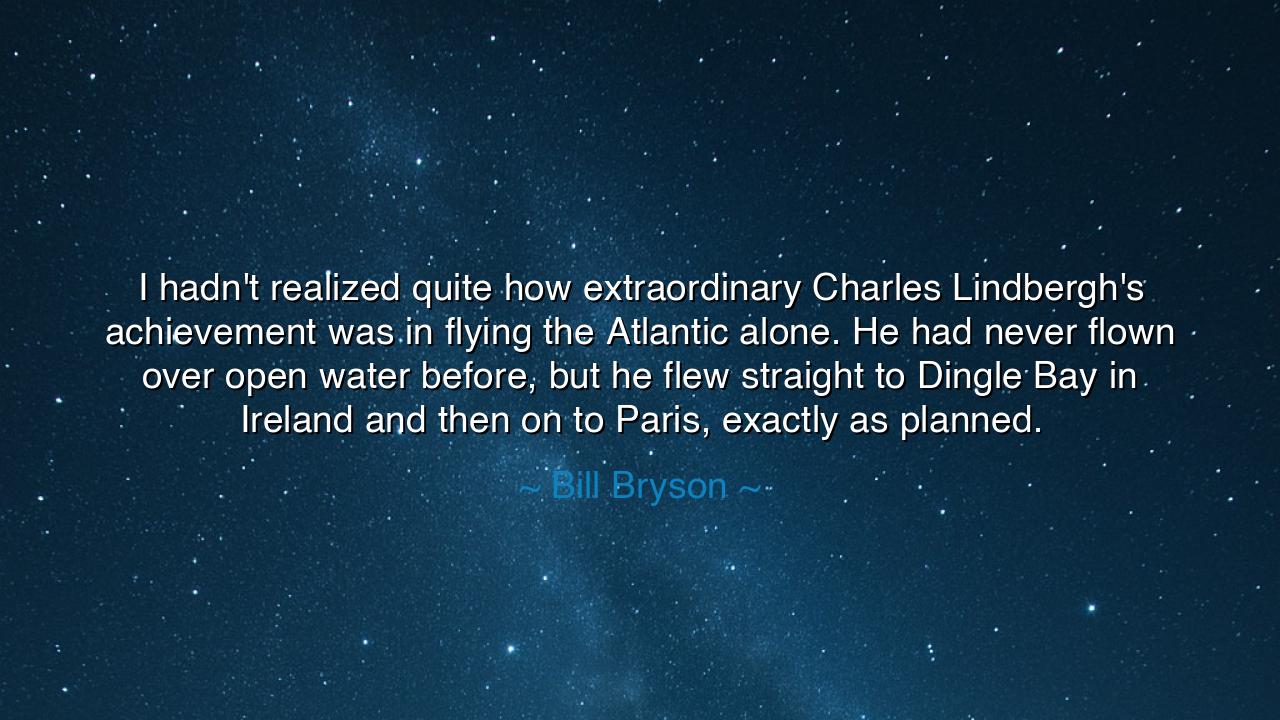
I hadn't realized quite how extraordinary Charles Lindbergh's
I hadn't realized quite how extraordinary Charles Lindbergh's achievement was in flying the Atlantic alone. He had never flown over open water before, but he flew straight to Dingle Bay in Ireland and then on to Paris, exactly as planned.






When the traveler and chronicler Bill Bryson reflected on the words, “I hadn’t realized quite how extraordinary Charles Lindbergh’s achievement was in flying the Atlantic alone. He had never flown over open water before, but he flew straight to Dingle Bay in Ireland and then on to Paris, exactly as planned,” he was not merely admiring a feat of aviation. He was awakening to the awe of human courage, that quiet, relentless force that drives one soul to do what others deem impossible. His words echo like a hymn to human daring—a reminder that greatness is often born not from certainty, but from faith and audacity in the face of the unknown.
To understand this moment, one must travel back to May 20, 1927, when Charles Lindbergh, a young man of twenty-five, stood beside his silver monoplane, The Spirit of St. Louis, at Roosevelt Field in New York. The world watched in wonder as he prepared for a flight no one had ever completed alone: the first solo transatlantic crossing, from America to France. He had no radio, no modern instruments, and no prior experience of the vast ocean he was to cross. For over thirty-three hours he flew through darkness, through fatigue, through the perilous silence of the sky, guided only by the stars, a compass, and an unyielding will. When at last he reached Dingle Bay, Ireland, and later landed in Paris to a roaring crowd, he had not merely crossed an ocean—he had redrawn the boundaries of possibility.
Bryson’s astonishment—his sudden realization of how “extraordinary” the act truly was—reflects a truth about human history: we often forget the scale of past bravery once success has made it familiar. We look back and see the triumph, not the terror; the outcome, not the uncertainty. But Lindbergh’s flight was a step into pure emptiness, a communion with solitude and danger that few could imagine. In his solitude above the Atlantic, he embodied the eternal human spirit that dares to face the void and trust in its own inner compass. His journey was not only across the sea—it was a journey into the essence of courage itself.
This kind of courage has been the wellspring of every great human leap. When Christopher Columbus sailed into the uncharted waters of the Atlantic, he too trusted in vision more than in maps. When Amelia Earhart later followed Lindbergh’s path across the same ocean, she carried the torch of his bravery, proving that courage knows no gender or boundary. And when the astronauts of Apollo 11 flew through the infinite blackness toward the Moon, they too were heirs to Lindbergh’s spirit—souls who trusted that humanity could reach beyond fear, guided by precision, purpose, and wonder.
Bryson’s reflection reminds us that even in the modern age, when machines have made miracles common, we must never lose reverence for the firsts—those moments when someone dared to step where no one else had stood. For it is one thing to walk a known path, and quite another to create it. Lindbergh’s achievement is a mirror for all who strive toward distant dreams: the tools may fail, the way may be unseen, but the heart that believes can navigate by faith alone. The stars that guided him still shine for those who dare to lift their gaze from fear to the horizon.
There is also a quiet lesson in discipline within this story. Lindbergh was no reckless adventurer; he was a craftsman of precision. Every detail of his flight was measured, every ounce of fuel calculated, every movement of his body aligned with purpose. His success was not a miracle of chance, but of devotion and mastery. He teaches us that courage without preparation is folly, but preparation without courage is stagnation. True greatness lies in the union of both—the calm mind and the daring soul.
The teaching, then, is this: do not wait until you feel ready to face the unknown. The map of destiny is never fully drawn. Whether your ocean is a dream, a struggle, or a calling, step forward as Lindbergh did—with faith in your preparation and trust in your inner compass. Let the world call it madness; let your own fear whisper caution. Still, take flight. For beyond the clouds of doubt lies the sunrise of discovery.
So, remember the wisdom hidden in Bryson’s awe: the extraordinary often hides in the ordinary until someone has the courage to act. Be that one. Lift your gaze to the unseen horizon. Chart your course with diligence, then leap into the wind. And one day, when you reach the shores of your own Dingle Bay, the world will marvel—not at the distance you crossed, but at the spirit that carried you there.






AAdministratorAdministrator
Welcome, honored guests. Please leave a comment, we will respond soon